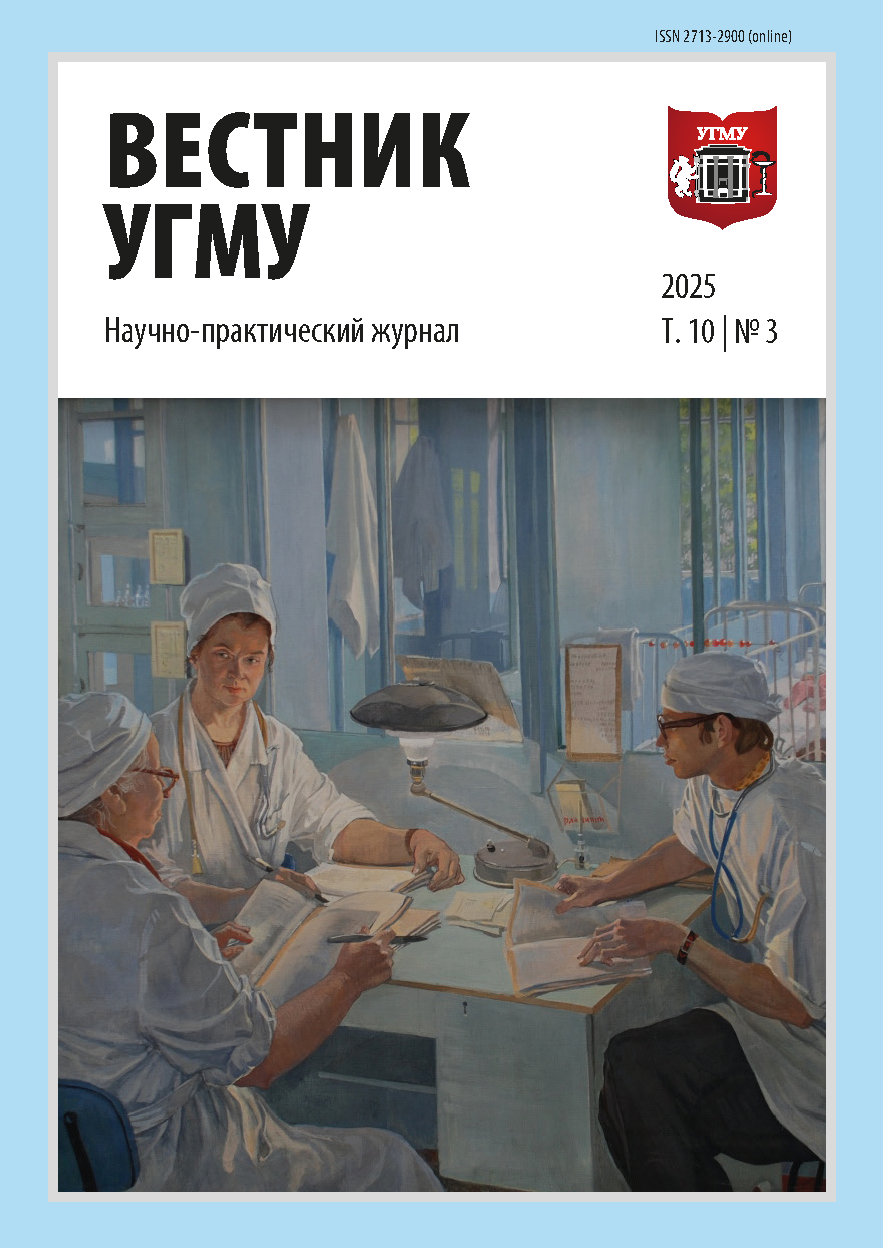Аннотация
Болезнь Крона у детей представляет собой хроническое воспалительное заболевание желудочно-кишечного тракта, характеризующееся прогрессирующим течением, вариабельной клинической картиной и высоким риском системных и локальных осложнений. В педиатрической практике диагностика и лечение болезни Крона остаются сложной задачей в связи с отсутствием специфических маркеров, разнообразием симптомов и возрастных особенностей пациентов. Целью исследования стал анализ клинических проявлений, лабораторных показателей, характера течения и структуры терапии у детей с болезнью Крона на основании регистра гастроэнтерологического отделения. В исследование включены данные 29 детей с верифицированным диагнозом «болезнь Крона» за период с 2009 г. по март 2025 г. Проведен ретроспективный описательный анализ медицинской документации. Оценивались возраст дебюта, пол, частота симптомов, индекс активности заболевания по шкале PCDAI, лабораторные параметры, наличие осложнений и применяемые схемы лечения, включая генно-инженерную биологическую терапию. Установлено, что наиболее частыми симптомами дебюта были абдоминальная боль (100 %), потеря массы тела (63 %), астенический синдром (55 %) и диарея (42 %). У детей младше 10 лет чаще наблюдались признаки выраженного воспалительного процесса: анемия, повышение скорости оседания эритроцитов, C-реактивного белка и тромбоцитоз. Осложненное течение выявлено у 41 % пациентов. Средняя задержка постановки диагноза составила 6,5 мес. Биологическая терапия назначалась по строгим показаниям у 6 пациентов. Полученные данные подчеркивают важность ранней диагностики, использования фенотипических классификаций и междисциплинарного подхода. Результаты могут быть учтены при разработке клинических маршрутов и стандартов оказания помощи детям с болезнью Крона.
Благодарности
Авторы выражают благодарность Детской городской клинической больнице № 9 (Екатеринбург) в лице главного врача И. П. Огаркова за предоставленные возможности для диагностики, лечения и наблюдения пациента; коллективу гастроэнтерологического отделения за квалифицированную помощь в сборе и анализе клинических данных.
Для цитирования
Шаруда ЕВ, Шеина ОП, Ильинская ОЕ, Естебесова ЮР. Опыт ведения детей с болезнью Крона в гастроэнтерологическом отделении. Вестник УГМУ. 2025;10(3):e00173. DOI: https://doi.org/10.52420/usmumb.10.3.e00173. EDN: https://elibrary.ru/GCEOJV.
Список источников
Ruemmele FM, Veres G, Kolho KL, Griffiths A, Levine A, Escher JC, et al. Consensus guidelines of ECCO/ESPGHAN on the medical management of pediatric Crohn’s disease. Journal of Crohn’s and Colitis. 2014;8(10):1179–1207. DOI: https://doi.org/10.1016/j.crohns.2014.04.005.
Benchimol EI, Fortinsky KJ, Gozdyra P, Van den Heuvel M, Van Limbergen J, Griffiths AM. Epidemiology of pediatric inflammatory bowel disease: A systematic review of international trends. Inflammatory Bowel Diseases. 2011;17(1):423–439. DOI: https://doi.org/10.1002/ibd.21349.
Van Limbergen J, Russell RK, Drummond HE, Aldhous MC, Round NK, Nimmo ER, et al. Definition of phenotypic characteristics of childhood-onset inflammatory bowel disease. Gastroenterology. 2008;135(4):1114–1122. DOI: https://doi.org/10.1053/j.gastro.2008.06.081.
Levine A, Griffiths A, Markowitz J, Wilson DC, Turner D, Russell RK, et al. Pediatric modification of the Montreal classification for inflammatory bowel disease: The Paris classification. Inflammatory Bowel Diseases. 2011;17(6):1314–1321. DOI: https://doi.org/10.1002/ibd.21493.
Eidelwein AP, Cuffari C, Abadom V, Oliva-Hemker M. Infliximab efficacy in pediatric ulcerative colitis. Inflammatory Bowel Diseases. 2005;11(3):213–218. DOI: https://doi.org/10.1097/01.mib.0000160803.44449.a5.
Uhlig HH, Schwerd T, Koletzko S, Shah N, Kammermeier J, Elkadri A, et al. The diagnostic approach to monogenic very early onset inflammatory bowel disease. Gastroenterology. 2014;147(5):990–1007. DOI: https://doi.org/10.1053/j.gastro.2014.07.023.
Sýkora J, Pomahačová R, Kreslová M, Cvalínová D, Štych P, Schwarz J. Current global trends in the incidence of pediatric-onset inflammatory bowel disease. World Journal of Gastroenterology. 2018;24(25):2741–2763. DOI: https://doi.org/10.3748/wjg.v24.i25.2741.
Uhlig HH. Monogenic diseases associated with intestinal inflammation: Implications for the understanding of inflammatory bowel disease. Gut. 2013;62(12):1795–1805. DOI: https://doi.org/10.1136/gutjnl-2012-303956.
Hyams JS, Ferry GD, Mandel FS, Gryboski JD, Kibort PM, Kirschner BS, et al. Development and validation of a pediatric Crohn’s disease activity index. Journal of Pediatric Gastroenterology and Nutrition. 1991;12(4):439–447. PMID: https://pubmed.gov/1678008.
Это произведение доступно по лицензии Creative Commons «Attribution-NonCommercial-ShareAlike» («Атрибуция — Некоммерческое использование — На тех же условиях») 4.0 Всемирная
© 2025 Шаруда Е. В., Шеина О. П., Ильинская О. Е., Естебесова Ю. Р.





